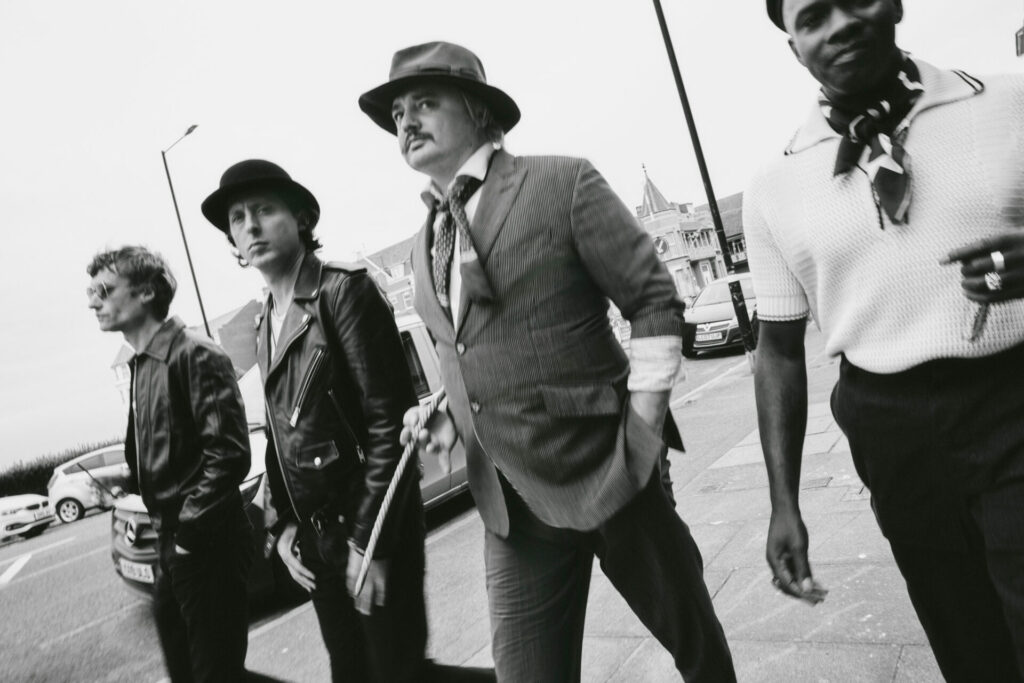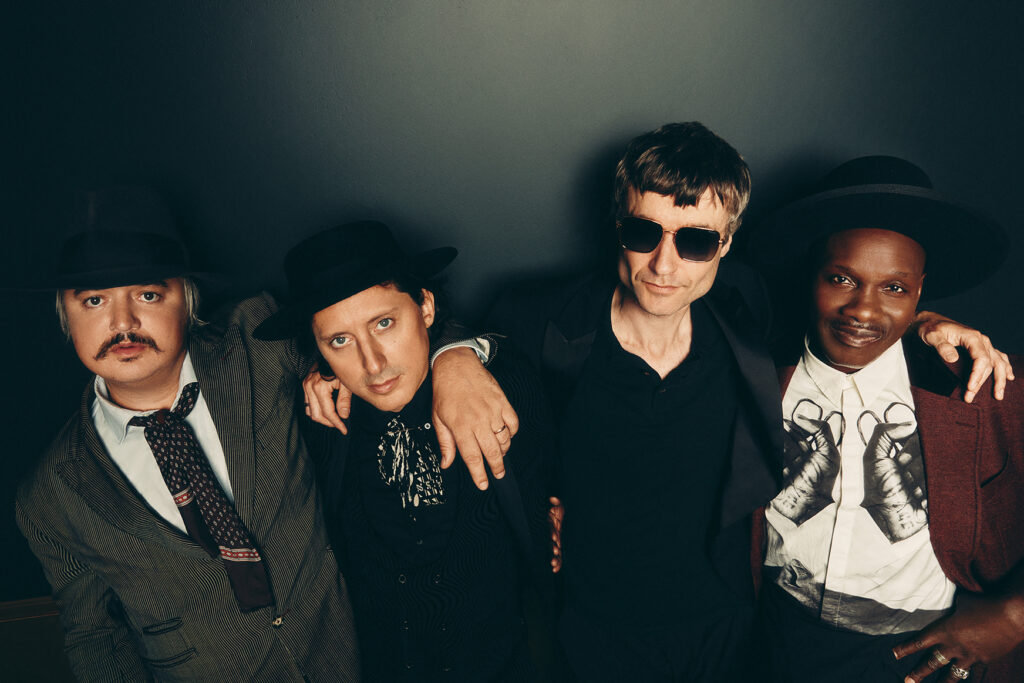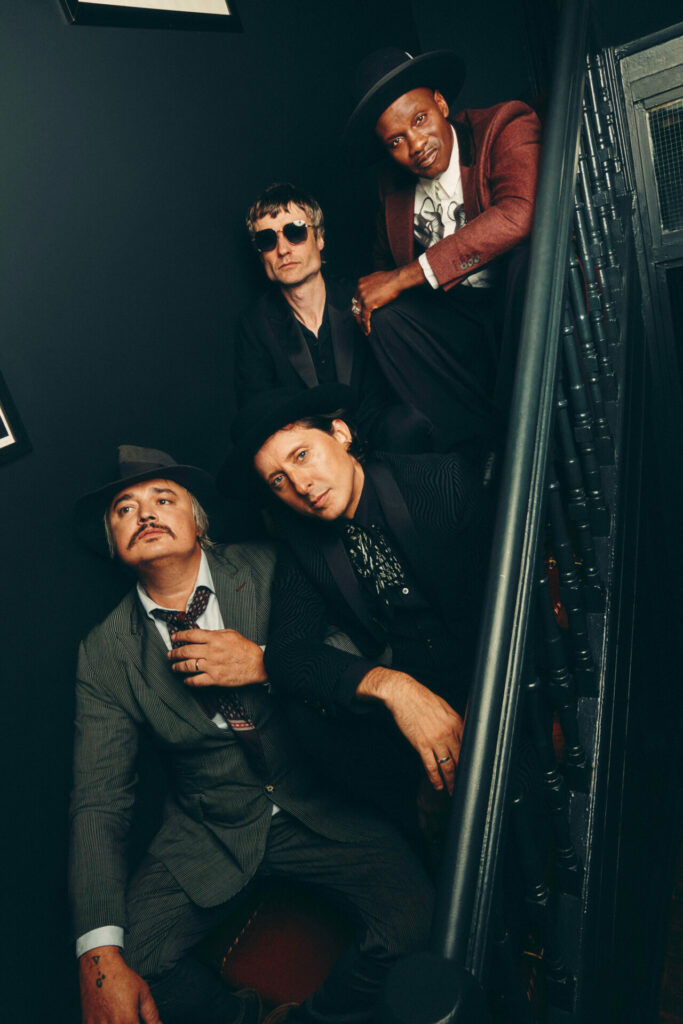How The Libertines got it together to make their fourth album
More than twenty years after spearheading England's latest rock n roll revolution, Pete Doherty and Carl Barat tell Rolling Stone UK about the genesis of All Quiet on the Eastern Esplanade, their upcoming fourth album.
By Nick Reilly

“We were in a glass studio at the top of a hill in the middle of a hurricane,” recalls The Libertines’ Pete Doherty. “All these birds kept getting confused and flying into the glass. There was a full-on eagle flying straight into it and, in the middle of all this, the Queen’s funeral was on the telly. It was quite apocalyptic really.”
Scenes like these, which occurred when Doherty and bandmate Carl Barât decamped to Jamaica for a writing trip in late 2022, feel perfectly representative of the way that The Libertines have existed for the past 20 years: constantly teetering on the thinnest of precipices between success and unparalleled chaos.
When the group first emerged at the turn of the century, they were the poster boys for England’s latest rock’n’roll revolution, a direct answer to the New York indie scene that was exploding across the pond, spearheaded by The Strokes.
There were shades of Mick and Keef in the brotherly, love-hate relationship between Barât and Doherty too, while the group’s first two albums — 2002’s Up the Bracket and 2004’s The Libertines — spawned a slew of era-defining indie anthems.

But wherever The Libertines went, turmoil followed. The group became slowly fractured, in large part due to Doherty’s much-publicised battle with heroin addiction, before splitting in 2004.
Nineteen years later, it’s a very different state of play for the Likely Lads. Doherty has been clean of hard drugs since 2020, while the group — which also consists of bassist John Hassall and drummer Gary Powell — are readying themselves for the release of their fourth album All Quiet on the Eastern Esplanade in March next year.
The follow-up to 2015’s Anthems for Doomed Youth is, according to Barât, the sound of a band in the most harmonious part of their career to date. “Our last album was a snapshot of The Libertines in disarray, whereas this album reflects The Libertines when we’re not like that,” Barât tells me. “There’s more harmony at the moment, which is useful for a band, innit. Things had drifted off at some point, but now I think they’re nicely back together again.”
One listen to the new record and it is immediately clear what Barât means. The ramshackle charm of their early work is back once more, but it’s tempered with a sense of reflecting on their here and now. Lead single ‘Run, Run, Run’ is a classic Libs back-and-forth between Doherty and Barât, but it also homes in on the idea of being a “lifelong project of a life on the lash” — something these two forty-something musicians can more than relate to.
“It’s autobiographical. It’s about us, it’s about time, and it’s about the world moving on and you know, not knowing if you’re running towards something or away from something,” Barât says.
It’s also helped by the fact that The Libertines have their own bonafide HQ down in Margate too. The album was recorded at the Albion Rooms, the studio and hotel that the group set up in 2019. “We were all there living together. First at the Albion Rooms and then at this place in Normandy, where I live,” says Doherty. “It felt like a collective, but we became this little unit, on a mission to get this album done.”
Now, it’s over to Pete and Carl to share the whole story behind All Quiet on the Eastern Esplanade.
We’re speaking hours after ‘Run, Run, Run’ was released. How do you feel now that the first Libertines song in eight years is out there?
Doherty: I’m fucking excited. Not that I was never not excited about things we’ve released, but you hear this one on the radio, and it really hits what we call the sweet spot. It hits with a precision that you might compare to a guided missile, though in the current climate it might not be appropriate to talk about guided missiles. But look, I’m proud of the lads. We’ve hit the back of the net, and I’m over the moon.
Carl, you said recently that 2015’s Anthems for Doomed Youth never felt like a proper Libertines album. Why was that and why does this record feel like a proper album?
Barât: It does feel like I’ve given that album a kicking, but I do love it. It was just a snapshot of the Libertines in disarray, whereas this one is a snapshot of us not in disarray. Which is just lucky timing and helpful when you’re making an album, innit?
Doherty: I just want to say one more thing about ‘Run, Run, Run’. We reached a point late on where we only had nine finished songs, and we were scratching around for a brand-new song when Carl pulled that one out and played it. I just said, “Where have you been fucking hiding that?!” He wasn’t sure about it and whether to hide it, but we ended up recording it in two days straight. We have these weird, sacred moments where we play each other the songs we’ve come up [with], and we’re never sure what everyone else will think. Carl was unsure about it, but I said we had to record it the minute I heard it.
There’s been a fair bit of drama in your own friendship too over the years. Where do we find Pete and Carl in 2023?
Barât: I feel like being together and doing what we do without any distractions has naturally brought us together. We’ve got so much in common, and we’ve shared so much, and our chemistry together is unchanging. At this time, we’re in the best possible place I think we can be.
Doherty: I think I’m just a little bit more relaxed these days. Without the fug, the sleeplessness, and the frenzy and always looking to score drugs. That’s all gone, but the lust for still trying to find the perfect song and turning to Carl and saying, “What have you got, turn out your pockets” when it comes to song ideas. And then there’s the business side too.

The business side too? This sounds like a different Pete to the one of old…
Doherty: Yeah, well, we’re looking to commercialise things ’cos we need to keep the Albion Rooms ticking over if we want to keep the venue and studio going. That’s hard work as we get a lot of young bands in to help them out. We’re not turning over a profit, but we’re staying afloat, which is exactly what we wanted with the Albion Rooms. And with energy prices being what they are too, I wanted to build a wind farm at the Albion Rooms.
A wind farm?!
Doherty: Yeah! I wanted to get a mini wind farm put on our studio extension, so I had the idea to put a small turbine on the roof. But you’re not allowed to do that, which for me doesn’t make any sense because surely that’s what we’re looking to do, isn’t it? For people to be self-sustaining and using renewable energy. We should get every street to have its own mini turbine. But the council in Margate wouldn’t let us do it.
It sounds like you’re living a more Zen existence in 2023…
Doherty: We used to live in a squat in Albion Road in Stoke Newington, and I was always amazed by this fella who used to live in a caravan out the back who ran the squat. We used to call him Delvin the Wizard, and he’d generate the power for his caravan on a converted exercise bike. I always thought that was amazing. It had never occurred to me before [that] that side of society existed. People who just wanted to break free from the system or live off-grid. But it’s actually quite simple, and it’s even more so the case now. We’ve got the technology for it, solar panels and wind turbines. So yeah, I’m all for a fucking green revolution, me. But a proper one, to put the power back in the hands of the people and to let them pedal their own fucking power! Why not? It makes perfect sense.
Pete, this is the first Libertines album you’ve made since becoming clean of drugs in 2020. How has the process changed in that sense? Less shambolic, I imagine?
Doherty: I just never used to enjoy being in the studio. I never really tried to spend too much time in there. It was always a question of having the songs ready, recording them, and then pissing off, to be blunt about it. I had better things to do; I wanted to score. But this time around, the songs weren’t ready, so I had to be there with Carl and the boys, finishing off the ones we have and then writing others together.
It was touch and go for a while for those first few weeks because we were trying to get into the pattern of living together — on top of each other. But fortunately, we were all in the same space and we really wanted to get it done. The most difficult part was the lyrics. We’d put the lyrics off until it became this mad blur of broken typewriters, I think we went through about six of them.
Barât: What’s that old saying? A fair day’s work for a fair day’s reward. We eventually managed to get around to that.
There’s a social urgency on this record, unlike other Libertines albums too. There’s the image of what it’s like to be a refugee in Brexit Britain on ‘Merry Old England’.
Barât: For me, we’ve always written about escape, and maybe there’s been a change in how we’ve embraced the world. But there’s definitely still an escapist element too, because we’re centring songs around Margate, which is where we’re ultimately based.
You’ve always discussed this feted ideal of Albion in your songs, which is an Old English name for Great Britain. How would you describe Albion in 2023?
Doherty: It’s many things. It can be two twins sat at home watching an old clip of a Libertines video, and their dad going, “Who’s this? The local pub band?” It’s a taxi driver short-changing a tourist. It’s a taxi driver being really kind to a tourist. It’s a little feeling in my stomach. It’s hard to describe it, but it’s a sense of homeliness, a recurring theme you’ve always come back to.
Pete, what’s an average day like for you in 2023? You seem to be living what seems like a rural and idyllic existence.
Doherty: I don’t know. Mind your business. My wife always complains when I say too much about our life. We’re trying to build a life for ourselves, and I just keep my head down really. I’ll walk the dogs in the forest, look after my new baby, watch a bit of telly. Do a bit of writing. I’d be lying if I said it was all perfect, but that’s we’re doing. Living it together and trying to build a life.
You both went to Jamaica in 2022 for a writing trip. How much of it was writing and how much of it was trying to strengthen your friendship?
Doherty: People thought we were off to Jamaica to just drink loads of rum, take loads of coke and go round on paddleboards. It wasn’t like that at all. We genuinely got our heads down to make some decent tunes and thought we had done, but when we got back it was all over the place.
Barât: Some of the stuff we recorded there did end up on the record. We had to have that trip because we weren’t necessarily ready to be full Libertines again, and we needed to go somewhere really far away. Why not pick somewhere really beautiful while you’re at it?
It seems like you’re both in a really good space, then. Was there ever a point over the past 20 years when you didn’t think you’d get here?
Barât: I’ve had a lifelong battle with depression of my own, to be honest with you. Pete’s problems didn’t help, but I always did my best to be supportive and understanding because we all have these problems and were never able to name them. Whether it’s depression or addiction, but I’ve had a lot of chaos and my own problems.
Doherty: It’s taken some absolutely unearthly skills for me to be standing here. Well, not standing, but slouching. I think I’ve been pretty on my toes, to be honest, dodging bullets. I’m full of holes [points to needle marks in his arms] but the bones are just about holding together. I’m battle-scarred and stumbling, but still here.
Pete, how often do you think about your friends that weren’t so lucky? You were close friends with Amy Winehouse.
Doherty: It’s quite difficult for me to talk about. Both Amy and Alan Wass [Doherty’s friend who died of a heroin injection], I listen to their music most days. So, I do think about it all, but I’d rather just not say offhand comments. My heart breaks when I think about some things, and this is just one of them.
But ultimately though, there’s a sense of harmony in The Libertines at the moment?
Doherty: Yeah, and the Albion Rooms has been a huge part of that. There’s no better feeling in the world, for me, than just sitting there in the gloom of an afternoon as some young band rolls up. They really believe in what they’re doing and getting out their guitars, tuning up and going through their songs while the low Margate sun shines through. I just love that. That’s what it’s about, and it just takes me back because they were the best moments for me in our early days. Just getting our guitars out and making a proper bit of noise.
